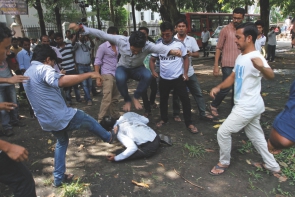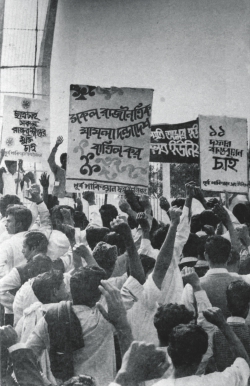| Home - Back Issues - The Team - Contact Us |
 |
| Volume 12 |Issue 05| February 01, 2013 | |
|
|
Politics BOYS WITH GUNS Zahir Hassan Nabil Student politics, under the two major political parties, has gradually become synonymous with thuggery in the last 20 years. Most of the criminal activities on the campus, proven and alleged, have been invariably attributed to the Bangladesh Chhatra League (BCL) and Jatiyatabadi Chhatra Dal (JCD) with Jamaat-Shibir activists covering the rest. Killing; mutilation; rape; wielding weaponry; vandalism and mugging; establishing armed supremacy at public universities; invasion of dormitories; inter and intraparty feuds over tenders; government contracts and other means of making money - extortion, illegal trades including drugs; making a fortune and ending up in a lavish future – have all become parts of the development.
People from different sections of the society voice their concerns today and some opt for a complete end to student politics. Students who are not active participants in politics now tend to become 'apolitical' just as the student leaders have become least bothered about the students. Ironic as it may sound now, as history has witnessed, student politics was originally aimed at students' welfare. In colonial times, the Swadeshi movement, instigated by students, sparked massive protests against colonial power. The establishment of students' union in the 1920s (which later turned into Ducsu - Dhaka University Central Students' Union) provided a platform for politically conscious students. The birth of Bangladesh Chhatra League in 1948 and Bangladesh Chhatra Union in 1952 majorly contributed to the language movement of 1952, the six-point movement in 1966 and the mass upsurge in 1969. Students' contribution in the Liberation War and their role behind the fall of the autocratic rule of Gen HM Ershad in the 1990s is also widely known. Contrarily, in the last two decades violence and crime in the guise of student politics have aggravated to such a point of offset that it can barely be contained by its patrons. Mujahidul Islam Selim, president of Communist Party of Bangladesh (CPB), opines: “Student politics harboured by the AL and the BNP in the present times is anti-politics, a negation and antithesis of the real student politics. The situation has worsened so much that either of the political parties cannot afford to pick out the criminals, because they would join their opposition,” he says. Selim observes that around the 60s the term 'students' movement' was used instead of 'student politics'. The objective underneath was to promote the idea of collectivism and patriotism within the students under certain ideals to promote consciousness about the society. In the process they used to get involved in the social and political process and become conscious thinkers about the country's polity. Such was the process of activism. Selim adds, “The ones who are carrying the torch of activism now have been marginalised by the AL and BNP. If the Ducsu elections were resumed, real student leaders would have been elected to represent the students. Instead the ones having muscle and money power - the so called cadre-culture, are filing in the blanks.”
BNP Joint Secretary General Ruhul Kabir Rizvi, a JCD activist in his time, says that there was scope for leadership formation when student politics used to have democratic elections. He adds, “Student leaders had a scholarly aptitude and connection with the academe which is not present in the present political culture. Fascist influences from the governments have been violating the self-governance of public universities by unduly influencing its administrative instruments to gain control over everything.” The grip of politics is entrenched very deep at every level on the university campus. Professor Imtiaz Ahmed of the Department of International Relations, Dhaka University, considers teachers' involvement with various political parties to avail privileges as one of the reasons behind demoralisation of student politics. “Political power is concentrated at a few points that can elevate certain teachers if it wishes so. A kinship and patron-client relationship grows out of this and thus the teachers encourage the students' factionalism,” he says.
Dr Badiul Alam Majumdar, who now heads Sushasoner Jonno Nagorik (Sujan), a civil society platform, actively participated in the mass upsurge of 1969. He asserts that the majority of students who embarked on politics were talented students and the teachers, unlike now, fended off all sorts of malpractice on campus. He adds, “After student politics became intertwined with criminal activities, the matter of ending it has been talked about. According to the Representation of the People's Order (RPO) 1972, the enlisted political parties do not have any constitutional allowance for such student wings. Because of the violent activities of the BCL during Awami League's tenure in the 1990s, Sheikh Hasina once said student politics would see its end if the opposition agreed. I think these so-called student parties should be banned but students' organisations must be there for students' sake, not for the political parties,” he says. Professor Khursida Begum of the Department of Governance and Politics, Jahangirnagar University, had put her 26 years of research on atrocities and misconducts on campus including student politics in her upcoming book Dhoshto Biddhosto Bishwabidyalay Theke Ekti Rajnoitik Bisleshon. She points at how student politics was incorporated into mainstream politics, “I think the promulgation of the Political Party Regulation Act 1976 radically changed student politics by incorporating students' organisations as a component of mainstream politics. Thus the gangsterism of the JCD and BCL starts when the main parties assume power.”
But one wonders how the student's political consciousness and collective stance against various injustice and malpractice have been distorted into factionalism and confrontational politics in the course of history. Are the students to be blamed solely for their depravity or is the malfunctioning democracy paving way for such atrocities? Former Vice president of Dhaka University Central Students Union (Ducsu) and Nagorik Oikya convener Mahmudur Rahman Manna thinks the Bengali students had a common enemy--the Pakistani forces that they stood against collectively. “Now there is no common enemy except internal feuds between BCL and JCD over the share of admission and tender businesses and establishing supremacy.” Manna thinks that moral corruption and decay among the youth in today's society is far beyond imagination but it is also true that commercialisation has engulfed the mainstream politics. “Sixty percent of parliament members are businessmen who do not have any background in politics, they have their own business agenda and thus became involved with the political powers to maximise profits. The university students observe this trend and become influenced. I think the corruption in mainstream politics has consequently corrupted student politics,” he says. Asked whether the banning of student politics should help, Manna replies that all public universities have suspended its students' political activities at different times, but it never helped. He says, "It does not matter whether or not Biswajit's murderers are rusticated, they will continue to be affiliated with their respective organisations. So the mainstream politics has to be changed or the students need to find an alternative. Our students who participated in the '52 language movement did not have to listen to the political leaders for churning out a revolution. Had they listened, the movement would not have taken place at all.” Sammilito Sangskritik Jote President Nasiruddin Yusuf Bachchu, a freedom fighter also thinks the political parties must be reformed first to reform student politics including the process to elect leaders. “If we consider the suspension of Ducsu elections, the current student leaders are not elected democratically, rather by the grace of their leaders. In the past, the students' organisations were never burdened with instructions from the political parties. For instance, as students, we figured out the need of the moment by observing the six-point movement and the declaration on March 7, 1971.” Every commoner in society understands that student politics is no discrete phenomenon from the mainstream politics and that the current student atrocities are its clear manifestations. One can recommend reforms in political parties but how? Political Columnist Badruddin Umar observes that the whole system is corrupted to such an extent that it cannot be mended instantly rather there has to be an alternative from within the people. “Who will do that?” he asks. “There is no revolutionary power for doing that. Now if we consider the past student movements, such revolutions cannot take place under the leadership of the present student leaders. They are involved in factional politics for their own benefits.”
It has long been a matter of debate whether our country is 'progressing' when 'democratic' practices have failed to satisfy people in the last 20 years with student politics having a debilitating effect on the whole of academia and the young generation. Umar responds, “It would be idiotic to say the country has not seen any development, there is definitely a cumulative development in the last decades. But the question is about the channels of wealth distribution which are actually being plundered. At least for now, all revolutionary alternatives in the society are fed by the mainstream political powers; hence they have no means to stand against the mass plundering widespread in the society. The students are not isolated from this malpractice. And you have experts in all sectors, there are critics philosophising their views on literature, poetry and what not except they don't have an ideal.” But what are the reasons behind the decaying of ideals in politics and in academia? Professor Mahbub Ullah, former chairman of the Department of Development Studies, Dhaka University, has a different way of looking into the problem as he analyses the structure of society. He believes that the capitalistic system in the modern society and the notion to be individualistic influence the students to go against collectivistic ideals. “Various instances of wealth accumulation including corruption, plundering the share market, evading tax, defaulting bank loans, human trafficking etc have gradually become rife in last four decades. This trend of capital accumulation for consumerism is totally against the 'plain-living high-thinking' trend of our times. We are also witnessing the modern trend of consumption worldwide through media and various means of globalisation. Above everything were the ideals when I actively participated in the '69 mass upsurge, but idealism does not have a place in this trend of consumption in the individualistic lives of our young generation. The students have to have social values that cannot also be generated in such a consumerist society. Roundtable, dialogues, critiques, post-editorials in the newspaper can raise awareness but things cannot get right all on a sudden unless the fundamental structure changes,” he adds. The professor's observations comes as an apt explanation to the query as to how and why 'student politicians' of the present times end up having lavish lifestyles from their ill-gotten wealth. True leadership is failing to emerge because of the dysfunctional demonstration of democracy by the major political parties. The missing piece in the puzzle is how the society can be replenished with the lost values and ideals in the anticipation that it will rejuvenate political consciousness among students to do away with the prevailing unwholesome political culture.
|
||||||||||||||||
Copyright
(R) thedailystar.net 2013 |





